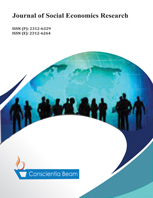An Empirical Analysis of the Impact of Decentralization on Poverty in Cameroon
DOI:
https://doi.org/10.18488/journal.35.2020.72.91.106Abstract
The objective of this study was to examine the effect of decentralization on poverty in Cameroon in a holistic stand point. This was done using data from the Ministry of decentralization and local development in Cameroon from 2011-2019, African election data and ECAM II and III. A Panel data linear regression model was used and the results showed that decentralization procedure is poverty reducing in Cameroon. These findings have implication for poverty reduction in Cameroon. The paper then suggests that by putting an effective and efficient decentralization strategy (that is letting local councils to exercise their own developmental activities by taking into consideration their local realities, there will be growth and development enhancing). This will equally lead to competition among councils in the country for creativity and other initiatives. To allow for a healthy working environment, both local and central governments should implement decentralization processes without reservations. Inspection, supervision and control should be intensified.

